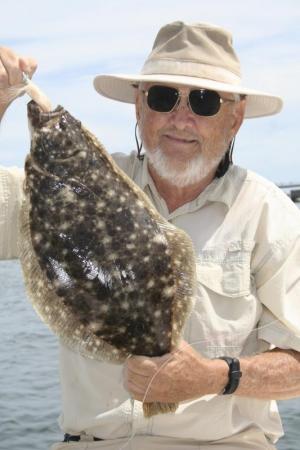I believe I can say this past summer was the worst one I have experienced since I began fishing in the 1940s. It’s not that I didn’t catch any fish; it’s just the ones I did catch were small.
Some of my problems were related to my 21-year-old boat and motor. It took me until August to get all the bugs out, and by then there was nothing in the sheltered inshore waters worth fishing for.
On the other hand, I was fortunate to have my good friend Larry Weldin and his nice Sportsman boat to fish on whenever the weather was suitable for two gentlemen of a certain age to go out on the ocean. If you followed the marine weather, you know those days were few and far between. Take this past week as an example. Seas running 3 to 5 feet with small-craft advisories flying from Tuesday on. Even if you have a big boat, 3- to 5-foot seas are not conducive to fun fishing.
On our best days, Larry and I caught many more small fish than keepers. The list consists of flounder, sea bass, croaker, bluefish, triggerfish and ling. While each trip put a few fish in the box, few is the operative word.
The spring got us off to a good start with another very nice run of big bluefish. Once again the blues were available from shallow-water locations such as the fishing pier in Cape Henlopen State Park to anywhere along the beach from Broadkill to Fenwick Island, Indian River Inlet, the Back Bays and even up as far as Oyster Rocks on the Broadkill River. Small boaters and kayakers found them between the Inner Wall and the fishing pier.
The spring tuna bite was good at the Inshore Lumps such as the Hot Dog, Massey’s Canyon and the Hambone. Then summer came and the fish went somewhere. They didn’t move off to the canyons, because charter boats had to switch from trolling for tuna to deep dropping for tilefish.
I think the real disappointment was with flounder. These fish are the backbone of our summer fishery, and they didn’t show up anywhere until late August when they finally made it to the Old Grounds and other ocean structure. Not only was it difficult for private boaters to find flounder, the charter and head boats had problems as well.
The only fish that seemed to be in good supply were sea bass. I was fortunate to get a spot on the Kattydid shortly after the season opened in late May. The trip was fantastic and everyone caught their 15-fish limit. Keeper sea bass kept coming in from the Del-Jersey-Land Reef all summer, and I even caught a few over inshore wrecks.
I hate to even mention Delaware Bay. While there was a good run of kingfish early on, they moved out and were replaced by small croaker and spot. Anglers who know how to fish the reef sites pulled out the occasional flounder and triggerfish. Triggers and sheepshead were available at the Inner and Outer walls and the Ice Breakers.
So why was fishing so bad over the summer? I don’t want anyone to get their panties in a bunch, but some of the problem is global warming. I have watched as southern species move north as the water warms, and some, like flounder, avoid the Delaware Bay and the Back Bays because the water is too warm. Just to make things more complicated, the bottom water in the ocean was 46 degrees well into the summer.
The other factor is the cycle of fish. Flounder have not had a good spawn in six years. If that does not improve, I am sure we will be hit with even more restrictive regulations.
As for spot and croaker, they are short-lived species, and over the past few years we have had good fishing for big fish. That would indicate those fish are nearing their maximum size and will die off. It takes a while for the stock to rebuild, and I believe that is what we are experiencing.
With fall on the doorstep I have no idea what to expect. We could see better flounder fishing in the ocean, or the hurricanes could mess things up beyond repair. The mullet run is underway, which could put bluefish close to the beach. In truth, anything is possible, so be ready to get out and fish if and when things get hot.
Menhaden meeting
The Atlantic States Marine Fisheries Commission will hold a public meeting to gather input on the Atlantic menhaden management plan Thursday, Sept. 14, in the DNREC Auditorium. The meeting will begin at 6 p.m. Written comments will be accepted until Friday, Oct. 20.






















































